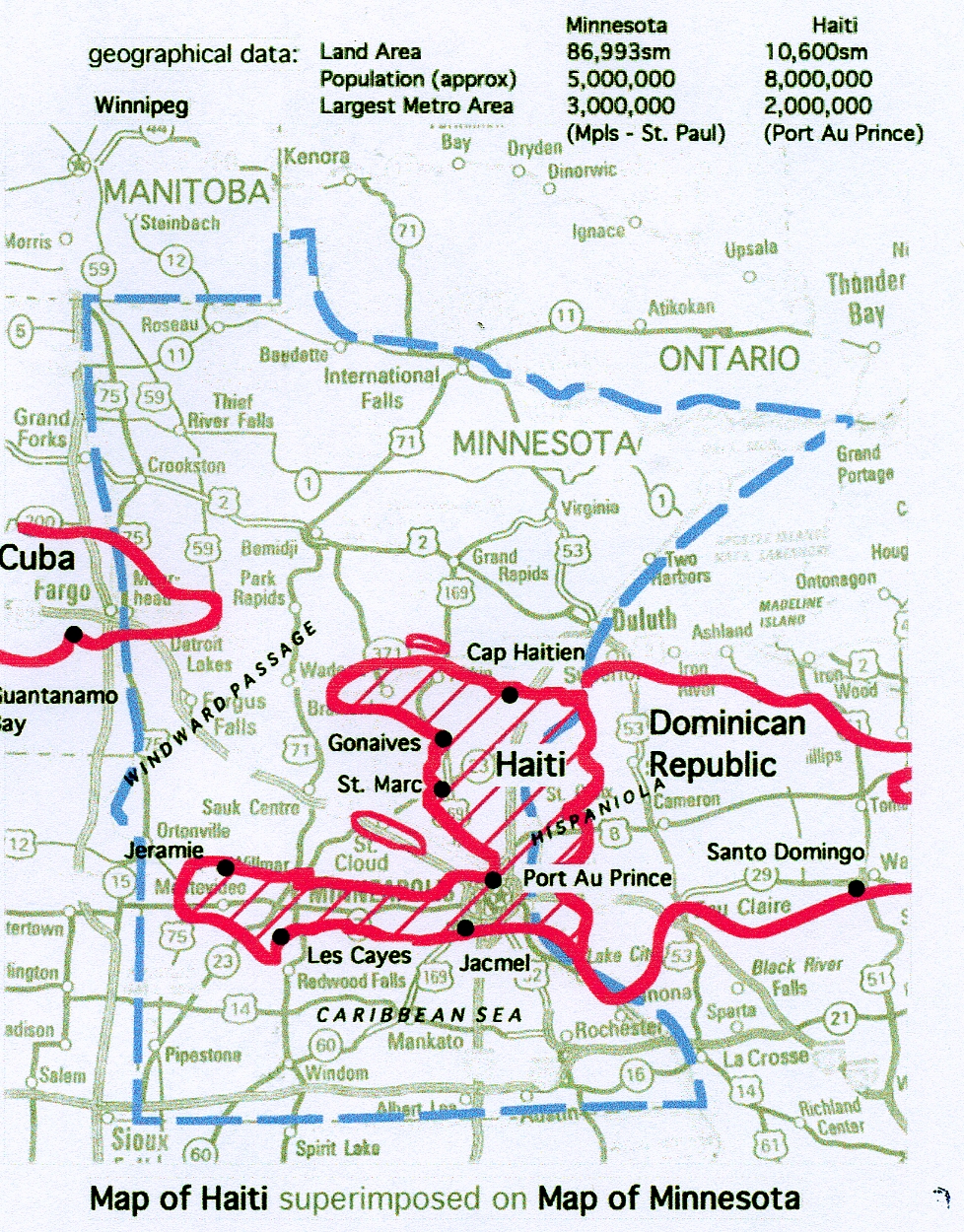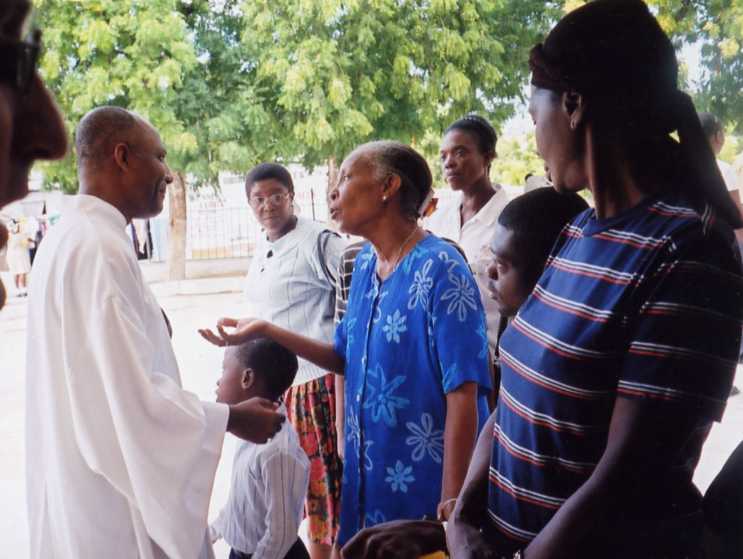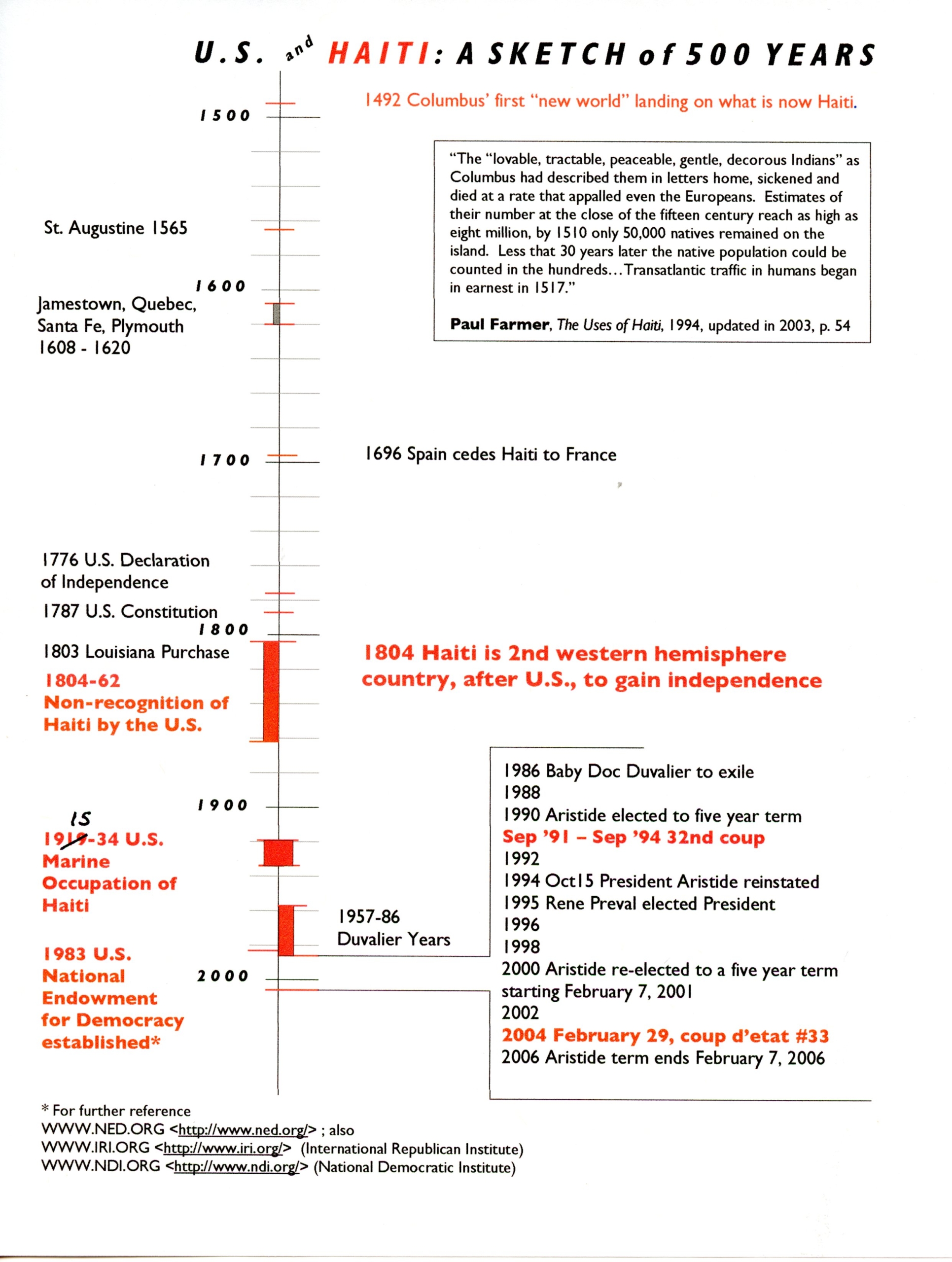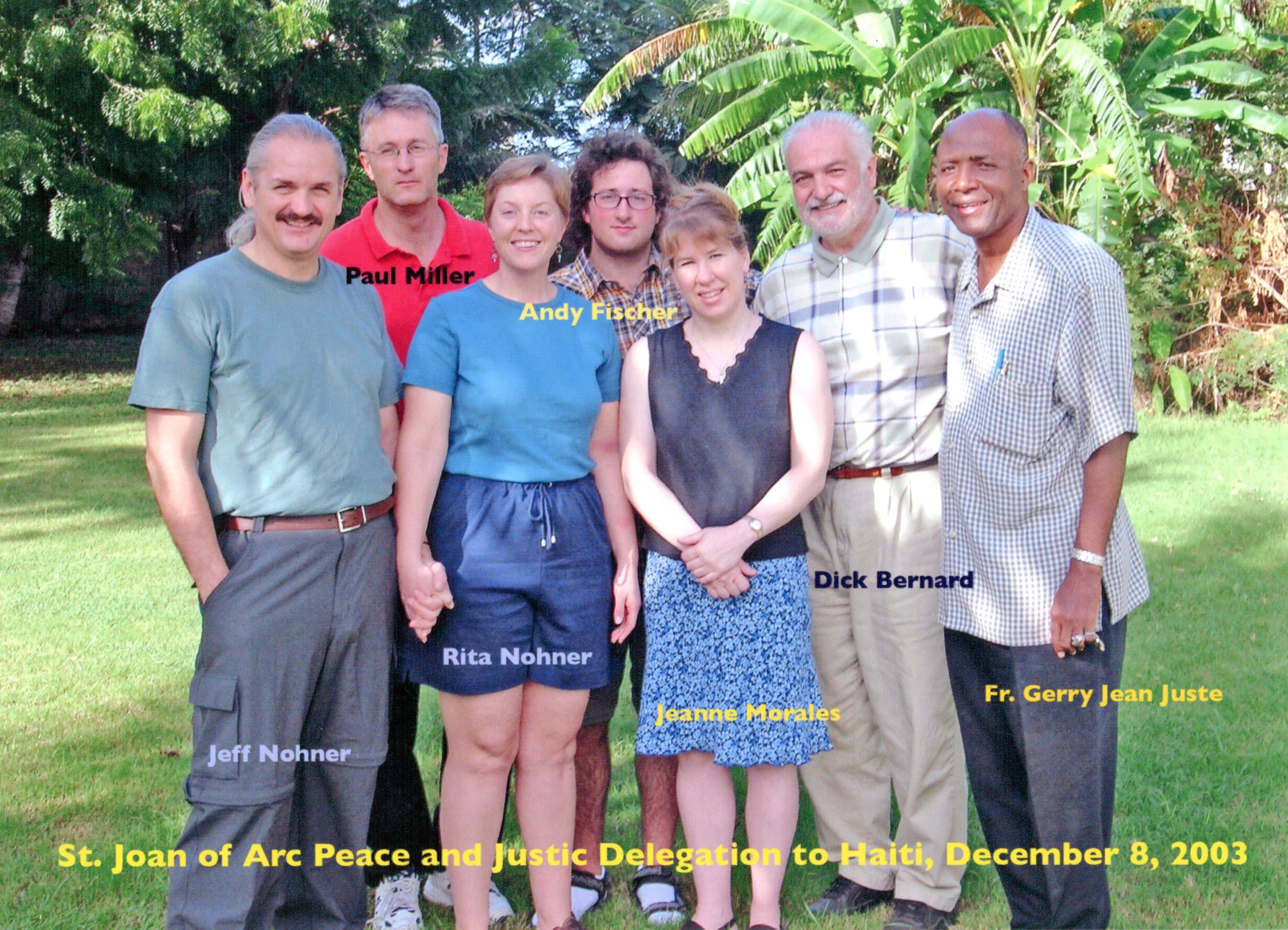Haiti
The major headline in today’s Minneapolis StarTribune: “U.S. ups embassy security in Haiti. Military flies to capital with gangs largely in control“.
This is not the kind of publicity one likes to see. The details are readily available on-line, so I won’t go into the current event. Rather, I want to afford an opportunity to look back at the Haiti I saw in two visits in 2003 and 2006.
Tens of thousands of Americans have been to Haiti, very few of them as ‘tourists’. Haiti is a small impoverished nation just to the east of Cuba. After my first visit I did a sketch map comparing Haiti with Minnesota (special thanks to Paul Miller for refinement):

There were two memorable trips, both about a week: both intensive study trips.
The first trip centered on Port au Prince and environ in early December, 2003. There were six of us in a journey expertly organized by Paul Miller. The second trip came in March, 2006, organized by the Microfinance group, Fonkoze, and focused on the interior of Haiti out of Hinche (Ench in kreyol), another extraordinary trip. (Ench is a community of about 50,000 approximately where the H in Haiti appears on the above map.)
I wrote about both trips on my return from each trip, and these and other observations are easily available to anyone interested here (click at Haiti in Focus).
Succinctly, I have very positive memories of the Haitian people I met on both trips.
Less than three months after we returned home in 2003, President Aristide, who brought democracy to the island nation, was deposed and exiled. We had primarily met with persons who shared his values and aspirations for the Haitian people.
The second trip our focus was on the poor in Haiti, aspiring to a better life.
I do not recall a single instance of fear or even tension on either trip, though particularly on the first trip there was clear political tension.
In my opinion, Haiti since it’s beginning as a French colony was noteworthy by its Declaration of Independence, by slaves, in 1804. It was far too close to the brand new slave holding nation of the United States, and I believe that one of the early actions of the new U.S. Congress was to refuse to recognize the country as a free nation. Books have been written about this difficult history.
We arrived in Port au Prince on December 6, 2003, and on December 7 – a Sunday – we went to a Catholic Church where Fr. Gerard Jean-Juste was pastor. Fr. Gerard Jean-Juste knew we Americans were in the pews and his remarks were directed our way, effectively. I took this photo of him with a parishioner at the time of the Mass.

Fr. Jean-Juste Dec. 7 2003
Later the same day we met with him at the guest house where we were staying. He was very impressive.
Being “impressive” to the common Haitian was not an asset in December, 2003. Fr. Jean Juste ended up in prison not long after we left Haiti. He was an apparent threat to the desired status quo. Three years later I met him again in Miami’s Little Haiti where he had effectively been exiled. He was apparently too dangerous for Haiti, but safe on the streets of the U.S….
Take time to learn more about Haiti. With all of our good qualities as a nation, we have lots to learn about relationships with others.
Haiti timeline I prepared after the 2003 trip. Errors in content are mine.

POSTNOTE March 16:
Here is a photo of the 2003 Study Group, in Haiti:

Dec. 8 was a wonderful day. The week to come was full and peaceful but at times intense. We were in the country when the storm clouds of a coup were far advanced. But the stereotype of recent news was not our experience in 2003, nor was it our experience in the interior in 2006. Personally I never felt at risk.
I was and I am not naive. But subsequent to the first visit I made a personal list of incidents proximate to us, or which played out after we returned to the states. For example, someone we met at a school. a few hours later was apparently assassinated near the Haiti Capitol building>. Someone else I met – a Priest – apparently was murdered by poisoning a year or so later…Fr. Jean-Juste thrown into Prison in Haiti, and then exiled to what essentially was freedom in Little Haiti in Miami, where I met him again in 2006, seemingly free, but far away from home – an interesting variation on being sent to Siberia. He seemed on community arrest. If he stayed in Little Haiti, no problem…. Or so it appeared.
In 2006 we were in the interior, very poor environment, but our group of perhaps 15 being shown around by Fonkoze was very well treated. In this second trip I can recall no nervous moments (other than traveling on roads which were definitely not thoroughfares – sometimes very dicey),
In neither year did we tempt fate by foolish decisions: it was less risky to go to church than to some neighborhood bar; less risky to visit with people trying to eke out a living, than getting into a political argument on the street. Come to think of it, even here at home, there is prudent or careless behavior. If one seeks trouble, one can find it.
Unfortunately, it seems that Jan 6, 2021, at our nations capitol, is now happening most every day in much of Haiti. Well armed gangs have taken over. Who knows what the solution might be…there is a solution, just what that is, is probably impossible to imagine at this tense time.
There are, of course, narratives about Haiti and about its governance, etc., etc. There was, there is, and there will remain mis- and dis-information. I don’t pretend to be an expert; Haiti is not a perfect society, neither is our own. All I can report on is what I experienced, and what I learned afterwards, including the aftermath of the 2010 massively destructive earthquake which killed hundreds of thousands. The website links give my personal impressions from the past trips.
Today, I gather, we could not fly into the PaP airport if we wanted to, and if we could and did we would be fools. And activities such as we participated in would now likely be very dangerous.
Today, with Gaza. and Ukraine, and all other places facing tension, we live in an unfortunately tribal society, I can only hope for positive outcomes.
What happens in Haiti, and Ukraine, and Gaza, and in our own country will affect all of us. It is far too easy to blame somebody for the problems. All of us need to be part of the solution. Keep on keeping on.
POSTNOTE 2 March 17: I was a geography major in college, and taught Junior High School geography for nine years, and probably could have headed for a career as a geographer had I not diverted into union work over 50 years ago.
Still, when I agreed to travel to Haiti in 2003, I really had very little knowledge about the island nation. I have had almost a college education since.
The group I traveled with was led by a supporter of Jean-Bertrand Aristide, the Catholic Priest elected as the first democratically elected President of Haiti, whose orientation was to the poor, which were the vast majority of Haitians, almost all illiterate, and who spoke a dialect which sounded like basic French, but was not the official French of the country. They were numerically superior, but almost totally disenfranchised.
Aristide came to power by an election opened to people who had never voted before, who could not read the ballot unassisted. Nonetheless, when the opportunity was given the people of Haiti underwent the hardships and the risks of casting their ballot, to freely elect their President.
Aristide was largely viewed as an outlier, an enemy really, of the developed world (i.e. the United States, et al). There are many roadblocks that can be, and were, thrown up to quash success of Aristide and those who supported him. If you look at the above timeline you will get a sense of this. At my previously mentioned website, I recounted my efforts to determine the legitimacy of the last Aristide election. At https://www.chez-nous.net/haiti3.html, scroll down to the link to Anatomy of an Official Lie, and read the link. It is, of course impossible for someone like myself to do a truly deep dive into “fact”, but in this case I think I got close to the truth.
In my opinion, Aristide was on the right track in Haiti, but this was frightening to the protectors of the status quo.
POSTNOTE3 March 18: I was listening to Jose Diaz Balart on MSNBC a few minutes ago, and he was talking about 63 years of chaos in Haiti – I specifically heard “63”. My experience with Haiti began 20 years ago, and my two contacts with the country are described above. 63 years ago would be about 1960, during the early times of Papa Doc Duvalier, whose repressive regime with his son Baby Doc spanned nearly 30 years, from 1957-86. The Duvaliers were not supporters of Democracy, nor champions of the poor. On the other hand, it seems they were reliable ‘friends’ of wealthier nations at the expense of their impoverished citizens.
I looked up Diaz Balart, who has a really interesting background and family. He is Cuban, raised in Spain, after Castro took control in Cuba in 1959. It is unclear where he was born, but mostly his early life seems to have been in Spain.
Credibly commenting on the Diaz-Balart comments would be foolhardy for me. But I have a guess that I know more about Haiti than Jose does, and more reliably as well. At the same time, when I visited and with whom I visited was a time when Democracy had had a brief chance in Haiti, but was also quite clearly quashed by forces outside the country, not the least of which were the United States, Canada and France.
I happen to like Balart’s work, but the comment about Haiti troubled me. Haiti is, after all, Cuba’s next door neighbor.
